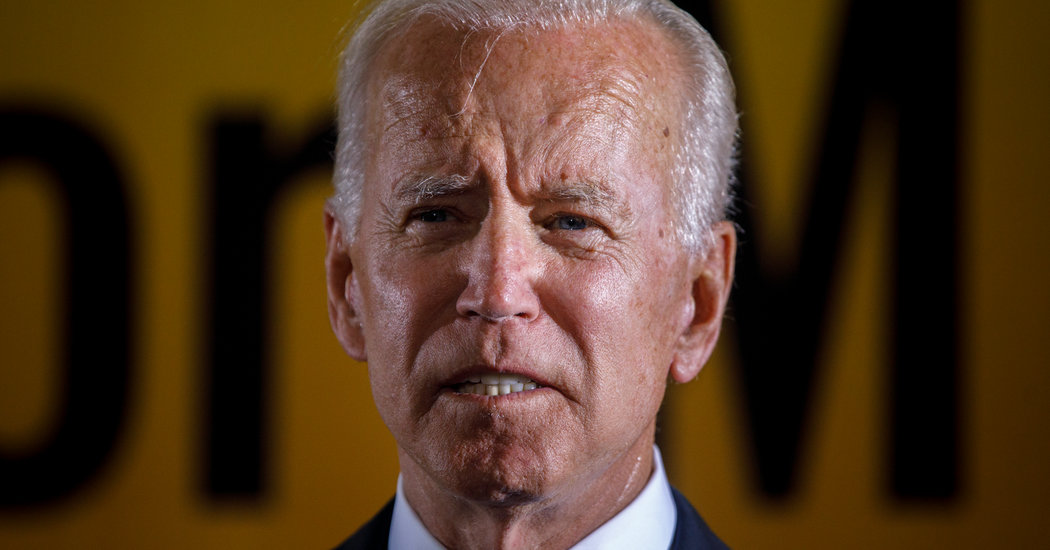WASHINGTON — From his treatment of Anita Hill in the 1990s to his unwelcome hugs of women, from his recent flip-flop on abortion funding to his latest remarks about segregationists, Joseph R. Biden Jr. has spent the early months of his third presidential bid doing a lot of explaining, justifying and pushing back.
The one thing he hasn’t done is bow to critics and apologize outright.
“Apologize for what?” Mr. Biden snapped on Wednesday evening after Senator Cory Booker of New Jersey, a rival in the 2020 campaign, said he should express regret for citing two Southern segregationist senators as examples of civility in politics. “There’s not a racist bone in my body.”
A few hours later, after Mr. Booker responded angrily on CNN to the former vice president, Mr. Biden called him in an effort to decrease tensions, according to two people familiar with the call. The tone between the men was conciliatory; still, the former vice president and his allies have stood by his remarks.
For decades, Mr. Biden’s garrulous political style has led to the kind of gaffes that contributed to the demise of his previous presidential aspirations. Yet Donald J. Trump’s refusal to admit any misstep during his winning presidential campaign may have shifted the gaffe gauge in American politics — as well as some Democrats’ expectations about their own candidates.
Mr. Trump demonstrated that a presidential candidate could violate many political norms — slurring and insulting groups of people, attacking and belittling fellow Republicans, offering few policy details, refusing to release his tax returns — and still win the office without expressing much in the way of contrition. Mr. Biden’s actions have not triggered anything like the controversies that Mr. Trump caused during his campaign and presidency. But like Mr. Trump, Mr. Biden does not appear concerned that voters will penalize him for standing his ground.
“The kind of campaign that Trump ran was an inflection moment,” said Chris Lehane, a Democratic strategist who spent years battling ethics scandals in President Bill Clinton’s White House. “The case can be made that the typically old conventional playbook is not the playbook people want.”
The unapologetic style of the early weeks of Mr. Biden’s presidential bid reflect how deeply his personal predilections drive his campaign: He saw no problem with drawing on his memories of segregationists like Mr. Eastland, even though the remarks were out of sync with both the current liberalism in his party and even some on his own campaign team.
While aides urged Mr. Biden to stop telling laudatory stories about segregationist colleagues in the hours after the news initially broke, Mr. Biden’s anger about the criticism — he saw it as cheap shots — overrode the advice of the professionals he has hired to manage his effort.
Senator Tom Carper of Delaware, a home-state ally of Mr. Biden, said the former vice president was aggrieved because he felt that instead of receiving sufficient credit for his decades of work on race issues, he was being criticized for using language that didn’t intend to offend.
“He’s done more to advance civil rights than everybody else running put together,” Mr. Carper said. “For him to be questioned about civil rights has to be a lot more than frustrating.”
Mr. Biden’s remarks came at a fund-raiser Tuesday night where he talked about Mr. Eastland and at one point recalled how “he never called me ‘boy,’ he always called me ‘son.’”
Sabrina Singh, a spokeswoman for Mr. Booker, said on Thursday evening: “Cory shared directly what he said publicly — including helping Vice President Biden understand why the word ‘boy’ is painful to so many. Cory believes that Vice President Biden should take responsibility for what he said and apologize to those who were hurt.”
For Mr. Biden, this campaign represents the first time in the 76-year-old’s long career that he is facing sustained onslaught of criticism from within his party. His actions since entering the primary race reveal a man whose politics and political style were formed before today’s highly woke social media era.
The controversy over his remarks dragged into a third day on Thursday.
“For the record, Cory Booker does *not* owe Joe Biden an apology for pointing out that waxing nostalgic about working with segregationists is insensitive,” Representative Alexandria Ocasio-Cortez of New York wrote on Twitter.
Mr. Biden’s decision not to express contrition underscores a central question in the 2020 race: Do Democrats want a candidate who can beat Mr. Trump at his own game? Or, if every election is a reaction to the last, do they want a more contrite political style?
Speaker Nancy Pelosi refused to criticize Mr. Biden, saying the value of his straight-talking persona outweighs his verbal missteps.
“I think that authenticity is the most important characteristic that candidates have to convey to the American people,” Ms. Pelosi told reporters at the Capitol. “Joe Biden is authentic. He has lived his life. He considers certain things a resource, that he has worked across the aisle, that’s what he was saying.”
Mr. Biden’s style cuts a sharp contrast with other 2020 Democratic candidates, who have offered a series of sorrys over everything from sexual harassment in their offices to policies they once embraced. Former Representative Beto O’Rourke of Texas has apologized for, among other things, characterizing his wife as his family’s primary child-rearer, launching his campaign on the cover of Vanity Fair, marrying into a wealthy family and fiction he wrote as a teenager. Senator Elizabeth Warren of Massachusetts apologized for her decision to take a DNA test to prove her decades-old claim of Native American ancestry. On Thursday, Marianne Williamson apologized for calling vaccine mandates “draconian” and “Orwellian.”
Harold Schaitberger, the head of the International Association of Fire Fighters, which has endorsed Mr. Biden, said Mr. Biden stressed that his actions are more important than his language.
“I understand this is a new generation,” Mr. Schaitberger said Thursday. “It’s not to me about, is your voice or language consistent with this new generation. To me it’s about, what have you done, what have you delivered, what do you stand for?”
That’s not enough for some civil rights advocates.
“It is authentic, but is that the type of authenticity we want? Donald Trump is authentic, too,” said Rashad Robinson, executive director of Color Of Change, a civil rights group. “The question is can a 70-plus man listen and evolve.”
Mr. Biden is no stranger to the potent power of a few misspoken words. The discovery that he borrowed unattributed portions of a speech from a British politician effectively ended his first presidential campaign in 1988. He opened his next primary bid, two decades later, struggling to explain his description of then-Senator Barack Obama as “the first mainstream African-American who is articulate and bright and clean and a nice-looking guy.”
Then, as now, he argued that those who might have taken offense to his comment understood the intentions behind his remark.
“He understood exactly what I meant,” Mr. Biden told reporters in 2007. “And I have no doubt that Jesse Jackson and every other black leader — Al Sharpton and the rest — will know exactly what I meant.”
Like Mr. Biden, his allies said he has nothing to be sorry for.
Representative Cedric Richmond, a Louisiana Democrat who is a co-chairman of Mr. Biden’s campaign, said the former vice president was merely describing the political atmosphere of his early tenure in the Senate.
“I don’t think he has anything to apologize for,” Mr. Richmond said. “He only pointed out the climate he had to work with, just like I have to work with Donald Trump, who I fundamentally do not agree with.”
Mr. Biden’s campaign, which has sought to portray itself as a level above the 22 other Democrats seeking the party’s presidential nomination, urged surrogates to fire back at competitors like Mr. Booker who criticize Mr. Biden by noting that they too have cut deals with Republicans with checkered histories on race issues.
“The point of the story is that you have to be able to work with people, even if they hold positions repugnant to you in order to make some progress,” read Biden campaign talking points sent to surrogates and allies Wednesday night. “Our opponents in this race agree — they’ve worked with Jeff Sessions, Steve King, Cindy Hyde Smith among others across the aisle to do their jobs in Congress.”
The issue is likely to come to a head this weekend, when the candidates descend on Columbia, S.C., for the state party convention and Representative James Clyburn’s “World Famous Fish Fry” — a quadrennial must-stop event for Democratic hoping to win the party nomination. Mr. Biden is attending the event, as well as participating in a closed-door round-table of black leaders.
The final two scheduled speakers at Saturday’s party convention are Mr. Booker and Mr. Biden.

















